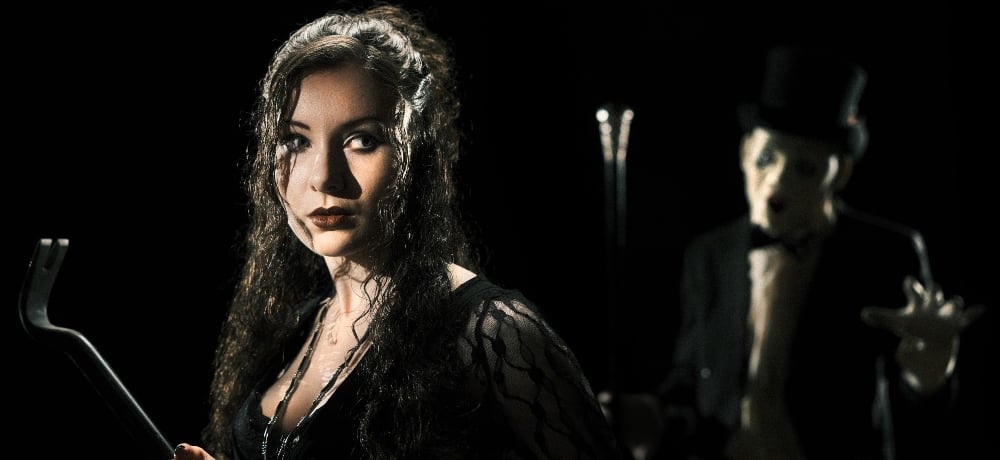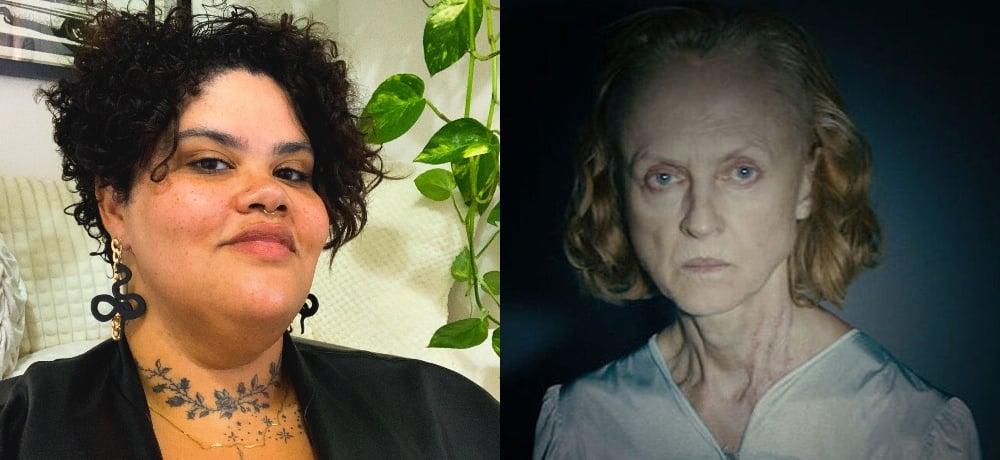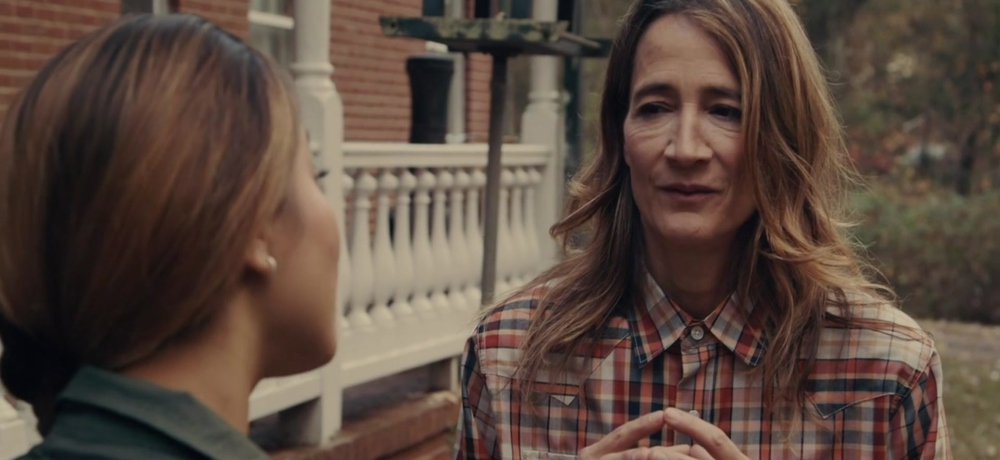






Happy New Year and welcome back for our first Let’s Scare Bryan to Death of 2021, where I’m kicking things off with a really fun discussion with Renée Bever. You may know Bever as an artist, horror analyst, and co-host of the great Attack of the Queerwolf podcast. I already knew that this was going to be a treat given her thoughtful, empathetic, and often hilarious approach to interpreting horror films. What I did not know, however, was that when she nominated Adam Robitel’s 2014 found footage film The Taking of Deborah Logan, I was about to watch the best movie I’ve seen since I started this column.
The premise, as is the case in most found footage films, is pretty simple. A group of grad students led by young Mia (Michelle Ang) are making a documentary about Alzheimer’s disease, and the movie picks up as they meet subjects Deborah Logan (Jill Larson) and her grown daughter, Sarah (Anne Ramsey). As the crew continues gathering footage, they soon realize there’s something more than Alzheimer’s affecting Deb’s steady mental and physical decline, and that a sinister supernatural force tied to Deb and Sarah’s past may be the culprit.
Like I said, pretty straightforward as found footage goes, yes? But as you’ll see in the discussion below, Robitel and co-writer Gavin Heffernan shatter the standard found footage tropes to produce a layered, thematically rich film that will also scare the hell out of you (SPOILER ALERT: As usual, we’ll be discussing major plot points throughout the interview).
Perhaps one of the best things I had going for me as I watched The Taking of Deborah Logan for the first time was that I knew virtually nothing about it. I’d seen the poster, but that was about it. I wasn’t familiar with the premise, I didn’t know who was in it, hell I didn’t even know it was a found footage movie. Bever recalls having a similar experience when she first saw it.
My friend was like, “Hey, I watched this really scary movie the other day,” and I was like, “Yeah right, it probably wasn't that scary.” [Laughs] But then we watched it and I, similar to you, didn't know it was found footage. And I just had no idea what direction it was going to go, so it was quite a surprise when I actually watched it. I thought it was so excellent, and there are so many things in it that scared me.
Bever and I have similar thoughts about the found footage subgenre in that we tend not to gravitate toward those types of movies while also acknowledging that there are a lot of great ones out there. For Bever, her initial hesitance toward found footage movies often stems from a framing device that hinders her ability to suspend disbelief.
I think that what puts me off sometimes is that as soon as I hear “found footage,” obviously we know it's not actually found footage. Sometimes the scary part of a movie is imagining how real it could be, and for me there's something about a found footage film where you know it’s fake, and I think sometimes that colors it for me. But then I watch it, the content is excellent, and I end up loving it. I prefer a movie where you start watching and an hour through, you're terrified, and you have to convince yourself that it's not real. And when it's found footage, I start out being like, “Well this isn't real.”
One of this film’s biggest strengths is that it takes its time in establishing the Alzheimer’s documentary as an entry point to the story, establishing the motivations of both the filmmakers and the Logans. And right off the bat there’s conflict, as Bever observes how the film crew initially takes advantage of the financially strapped Logans.
Yeah, I love how it's like these grad students go into it totally clueless about what's actually going to happen, and then they really get their asses handed to them. I feel like it's some kind of revenge for every exploitative research situation that has ever happened to people who get involved in it because they need the money, which I think was a really interesting part of this when Sarah is like, “The grant money is still part of it, right?” And the reason they try and stick it out is because they need the money. I really appreciated that piece of it, otherwise it's kind of hard to believe why. The motivation of the grad student to finish the research and motivation for the family to get the money for the research help me understand why anyone would keep going with any of this. So, I think it was really smart on their part to have those things included.
But where The Taking of Deborah Logan really shines is that it doesn’t stop at simply establishing a feasible reason for this film to exist. It gives us complex, nuanced characters with Sarah and Deb at its center. Sarah in particular left a significant impression on Bever.
I love Sarah. I love her inclusion as a queer character, but that nothing about her story is any of the typical plotlines we see queer folks receive in film. It has nothing to do with her coming out, it has nothing to do with her having some secret life, it’s like, “No, I'm here. My mom doesn’t like clothes that I wear, and we're kind of bickering all the time about that. But I'm here holding down for my mom.”
She really goes so hard for Deb even though Deb is so high maintenance, and not even just in the progression of her Alzheimer's. You can tell Deb was a very persnickety person her whole life. She wanted things a certain way. There's a lot of respectability politics in the way she kept her home, and how she likes things to be presented. I really love that kind of back and forth they give her and Sarah, where you can tell she’s just kind of nitpicking with Sarah. She tolerates her, and is maybe somewhat accepting, but she wishes Sarah was more femme or that Sarah did different things. It was such a realistic portrait of what, for some queer folks, what they have to go through to spend time with their families. And the things that we have to set aside when it comes time to take care of family who need our help.
I love that they just let Sarah exist as a queer person, and that wasn't the main note of her story. But for queer folks watching this story, there's a very relatable plot. We try to stick by our parents in ways that they don't necessarily stick by us. [We see] the gracious nature of Sarah, and how she is trying to inform the crew what her mother likes and how to best get along with her mother. Because she's learned that so well, about things to do and say, how to act in ways that please her mother, and what makes it easiest for the day and night to pass. Except there's certain things that she's just not going to change about herself, whether it's her flannel button-up, she doesn't get nails done, or whatever her mom is complaining about at the time. There's certain things that she stays very true, but of course also stays true to her mother.

While Robitel could have just leaned into the conflict between Sarah and Deb, he explores family dynamics that are often much more complicated. As the film unfolds and we learn that Deb’s being possessed by the spirit of an occultist who was murdering girls when Deb was younger, it’s also revealed that Deb killed him when she learned he was targeting Sarah.
I love that. I love how it shows some of the different ways that families love each other... Deb killed someone for Sarah. With a garden spade to the neck. It was not a game. And yet there’s still these things that she's clearly just tolerating about Sarah, and I think that's so relatable because so many of us have parents or family members where it's like, you know, “I really think my mom would catch a case for me if she really needed to handle business in that way, but later she might start quoting Leviticus or Exodus or whatever Bible verse homophobes get their inspiration from.”
I think it's a good representation of how it's really up to you what you decide is okay to accept from your family, what you decide is what you want to fight about with your family, what you decide is a dealbreaker for you. It appears that for Sarah, it's not a dealbreaker that her mom would prefer that she didn't wear that jacket for the interview because it's just so much in line with her mom's personality to care so much about these tiny little details. And Sarah is so good, for better or worse, at accommodating her mom.
By establishing a realistic, complex relationship between Deb and Sarah, Robitel sets up the horror and the tragedy of being a caretaker for a family member that exists regardless of whether or not there’s a demonic element at play. As someone who has cared for family members in such a way, Bever really connected with this narrative theme.
There's something so heartbreaking and gut wrenching about... obviously there's a supernatural element in this film, so it's not everybody's caretaking story, but for people who have helped their aging parents, grandparents, aunties, cousins, and sometimes people younger than us, sometimes in their last days it gets gnarly. And there are all kinds of things you would not expect in terms of emotions, but also just the way people's bodies decline and the kind of things that happen to the mind, whether they have Alzheimer's or not, the kind of cognitive things that happen and how painful it can be to watch your family member deteriorate in that way. And you have to shift your relationship to one of caretaker, or to the one who is changing someone’s diaper, or making sure they’re eating throughout the day. The horrific nature of having to watch your loved one die and decline.
Definitely one of the scariest parts of this movie is having to watch Sarah watch her mom, and to have to watch Sarah have to find out all these new things about her mom’s body and mind and past and present that are just so terrifying. And of course there’s supernatural elements to this movie so not everyone is going to relate to that. But I think that in terms of watching your loved one transition to death, a lot of it is just so very relatable and I think that makes it really fucking scary.
I love when they show Deb the footage of her hacking at the ground naked with a spade, and Deb’s like, “Oh God, is that me? That's obscene!” And she's absolutely mortified because not only is she doing something that she would actually never ever do, she can't remember any of it. And that was just another punch to the gut of how devastating Alzheimer's is, or anything that impairs someone's ability to remember or to understand what they've done or what they want to do.
It's just another level of scary in this film, or I guess most possession films, where you watch someone lose themselves to something else. And in these movies, in particular when it's a demonic presence or something evil, I don't know what it's like to lose my mind in that kind of way. I think it's so chilling to think about, and to have to watch Deb... you know the other element where clearly there's something going on that’s not Alzheimer’s, but no one believes Deb or Sarah that there’s these extra things going on. This is more than Alzheimer’s, and people not having answers is scary.
Indeed, Robitel and company never forget that ultimately this is a horror film, so while the dramatic arcs make for a richer, more well-developed story, they don’t skimp on the scares. And they do so by seamlessly blending frights that intertwine the Alzheimer’s with the supernatural elements.
Some of the other really scary moments for me with Deb are when she keeps kidnapping Kara from the Children's Hospital and at one point when they're trying to handcuff her, they’re like “Kara, Kara, come here.” And Debs’ not doing anything, she’s just staring. You don’t know what she’s staring at. She’s got blood on her hands. And all of the time it takes to approach her slowly and handcuff her, there’s just suspense. You don’t know at what point Deb is about to snap. I love waiting on that, and I love how scared we get to be of Deb because Deb is like a frail old woman, and in the end even before she unhinges her jaw, you’re like, “Oh my God, I am scared to death of this lady.”
I love the moments with her when Gavin catches her gardening and playing with the snakes. It’s the moments where you start to feel like maybe this isn't just Alzheimer's. I feel like they do a really good job of separating those moments out where you start to question if it’s just her diagnosis because there’s just this dark energy that starts brewing.
And ultimately, for Bever, it’s the way these scares blend with the humanity of the situation that makes The Taking of Deborah Logan truly memorable.
What's scariest about this movie is the places loving people can take you, and that kind of vulnerability it takes to advocate and care for someone who can't care for themself anymore. Whether it’s Deb taking care of Sarah when she’s little or Sarah taking care of Deb as she aged, there's these levels of relationships and the fear that goes along with those levels and that kind of humanity that is shown in this movie.